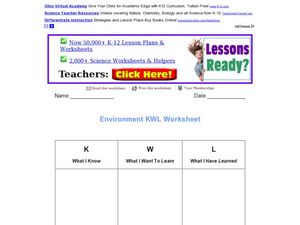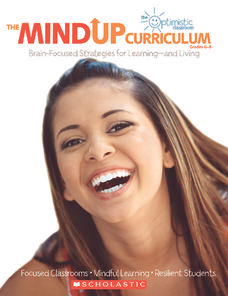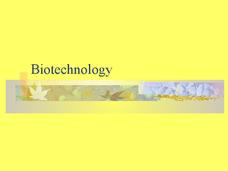Curated OER
Comparing Elements and Compounds Venn Diagram
In this comparing elements and compounds Venn diagram worksheet, students compare and contrast compounds and elements as they list details to complete the graphic organizer.
Curated OER
Environment KWL Worksheet
In this environment KWL worksheet, students fill in the graphic organizer with details they already know, want to know, and have learned regarding the environment.
Curated OER
Element Symbols
For this elements worksheet, students complete a graphic organizer by writing in the correct symbol for the 12 elements given.
Curated OER
Asteroid, Comet, or Meteor?
In this asteroid, comet, and meteor graphic organizer worksheet, students compare and contrast asteroids, comets, and meteors as they mark the characteristics of each.
Curated OER
Inside the Earth
In this composition of the earth graphic organizer worksheet, students research the relative temperature and composition of the earth's crust, mantle, and core.
Curated OER
Forces of Nature: If I Was A Hurricane
In this comprehension worksheet, students complete a graphic organizer and answer questions. Students pretend they are a hurricane, and use what they have learned to complete the questions.
Curated OER
The Relationship between Temperature and Reaction Rate
In this temperature and reaction rate worksheet, students complete a graphic organizer to show the relationship between temperature increasing and the rate of a reaction and temperature decreasing and the rate of a reaction.
Curated OER
Chemical Changes or Reactions
In this chemical changes worksheet, students create a concept map for chemical changes or reactions. They indicate the definition, the description, they give examples and they give non-examples in a graphic organizer.
Curated OER
Comparing Minibeasts
For this "Comparing Minibeasts Data Worksheet", students respond to four short answer, one drawing, and eight graphic organizer questions.
Curated OER
Living Things?
In this living things graphic organizer worksheet, students decide whether the 10 things listed are living or not as they consider the 7 attributes included on the chart.
Curated OER
What is My Tongue For?: Tasting Apples
In this apple tasting graphic organizer worksheet, students use the descriptors to describe the look, taste, and results of the Royal Gala, Braebuen, Granny Smith, and Golden Delicious apples. Students also respond to 1 fill in the blank...
Curated OER
What Do Plants Make?
In this plant worksheet, students study the items that are made from plants. Students complete 2 sides of the graphic organizer that is given filling in that which comes from plants and that which does not.
Curated OER
Nellie Bly's Newspaper Club: Introducing the Science of Writing
Students evaluate a video about Nellie Bly, a famous reporter from the 19th century. They consider what makes a high-interest news article, write an essay in pairs and present it a literary tea.
PBS
Exploring Earthquakes: Earth Foldable
Geology junkies will make a foldable that covers a lot of ground regarding Earth's internal structure, its position in the solar system, and an explanation for its seasons. Templates and a printable page of instructions are included....
Scholastic
Mindful Listening
Teach your middle schoolers to use their ears to their highest potential! Pupils practice active listening skills and reflect on how careful listening might prove to be important in and out of the classroom.
Curated OER
Nonfiction KWL Chart
In this KWL Chart worksheet, student students choose a book title or topic and fill out a chart based on what they already know, what they wonder about, and what they have learned.
Council for the Curriculum, Examinations and Assessment
Relationships and Sexuality
Adolescence is a tumultuous time for the learners in your class. Guide them through the rocky world of friendships, risks, personal health, and emotional turmoil with a set of lessons about teenager relationships and sexuality.
EngageNY
Real-World Positive and Negative Numbers and Zero
Class members investigate how positive and negative numbers are useful in the real world. Individuals first read a short passage and identify terms indicating positive and negative numbers. They consider situations involving positive...
Curated OER
Fairy Tales
Once upon a time are four words most children are familiar with when reading a fairy tale. But do they know that fairy tales are a great way to learn the literary elements of reading and writing? Use a thorough fairy tale unit to teach...
Roald Dahl
James and the Giant Peach Lesson Plans
Immerse yourself in the world of giant bugs, rolling peaches, and brave little boys with an interdisciplinary unit on James and the Giant Peach. Young readers focus on the scientific themes of Roald Dahl's classic novel with bug hunts,...
Curated OER
Biotechnology
A continuous cascade of information comes through this PowerPoint on biotechnology. The topic is defined, a history is presented, and basic genetic engineering techniques are explained. The topic is covered in an objective manner,...
Curated OER
Using Amino Acid Sequences to Show Evolutionary Relationships
Junior biologists compare the amino acid sequences from fragments of five different globin molecules. They count the letter differences between each species pair. They construct a graphic representation of the evolutionary relationships...
Curated OER
Genetics and Genetic Engineering
Pretty purple slides present a plethora of jargon related to genetic engineering. Most of them have one term across the top and a brief explanation of that term below. They are arranged in alphabetical order, which may not be the most...
Curated OER
The Human Body: Bones
Here is an interactive PowerPoint about the skeletal system. The first slide shows the entire skeleton and allows learners to try to name each major bone structure before clicking to show the answer. The following slides provide more...

























